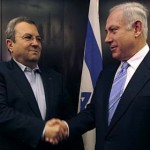Arms and the Middle East: Was Halted German Ship Carrying Ammunition from Iran to Syria?The Latest from Iran (14 October): Watching Karroubi, Rafsanjani, and the Supreme Leader’s HealthReceive our latest updates by email or RSS SUBSCRIBE TO OUR FEEDBuy Us A Cup of Coffee? Help Enduring America Expand Its Coverage and Analysis Iran Review has posted an interesting essay by Dr Mahmoud Reza Golshanpazhooh considering "the extent of Israel’s isolation in the world". The article starts from the controversy over the Goldstone Report on the Gaza War, but it quickly moves to "Israel['s] game of posing military threats to Iran’s nuclear facilities". Golshanpazhooh notes shrewdly, "This policy has got an expiry date because the more it is repeated, the less it would be taken seriously by the audience", and then links Gaza, Palestine, and Iran in a challenging conclusion:
Iran Review has posted an interesting essay by Dr Mahmoud Reza Golshanpazhooh considering "the extent of Israel’s isolation in the world". The article starts from the controversy over the Goldstone Report on the Gaza War, but it quickly moves to "Israel['s] game of posing military threats to Iran’s nuclear facilities". Golshanpazhooh notes shrewdly, "This policy has got an expiry date because the more it is repeated, the less it would be taken seriously by the audience", and then links Gaza, Palestine, and Iran in a challenging conclusion: it is time to add another variable to Israel’s threat analyses on possibility or impossibility of an Israeli attack on Iran: Israel’s international prestige....Tel Aviv cannot possibly afford to further damage its international image in return for destruction of nuclear facilities where no international body [or] intelligence agency (even that of Israel) has been able to prove any deviation from non-peaceful military activities.
Golpanshooh is an academic, rather than Government official, but if his view is shared by Tehran's bureaucracy (and I think it is), then Iran's international strategy is now based on a stronger bargaining position.Israel: International Prestige & Attacking Iran’s Nuclear Facilities First: On September 29, the meeting at the United Nations Human Rights Council was quite different from the preceding days. Security was tight, entries and exits were controlled, there were limitations for representatives of nongovernmental organizations and media crews and all seats were occupied to prove that the day’s agenda was a special one. In fact, it was nothing but the report of the Human Rights Council’s fact-finding mission on the war in Gaza with its author, Justice Richard Goldstone, and his three colleagues doing their best to show that it has been based on justice and objective observation.
The report proved that Israel’s violations of human rights and international humanitarian laws were much more numerous than those by Hamas. The interesting point was the anti-Israeli atmosphere which dominated the meeting. Almost all the participating countries had asked for the chairman’s permission to talk about this issue and almost all of them talked against Israel’s measures in Gaza. Few countries, mostly Western, which usually try to change the balance in such meetings in favor of Israel, issued their statements by emphasizing that Hamas should pay more attention to the findings in the report and also questioned Justice Goldstone about the process of the report writing and its credibility.
In that meeting, the extent of Israel’s isolation in the world, especially when the world public opinion was concerned, was clear to me.
Second: Announcements about Iran building a second uranium enrichment facility around Qom have rekindled debates about a possible attack on those facilities by Israel. Some analysts maintain that Israel is losing this opportunity and if it did not attack Iran as soon as possible it would regret that in the future. Others, however, maintain that construction of the new facility has proven to Israel that the success of a military attack on Iran’s nuclear facilities is much less possible than what Israeli radical figures try to show. The second group of analysts believes that Iran has implied to Israel that it is capable of rebuilding its nuclear facilities by relying on local know-how and has made Israel more doubtful that Iran may have other nuclear facilities which are still hidden and out of the reach of the Israeli military.
Third: I read a sentence somewhere, which was very interesting to me. It noted that if Israel continued its game of posing military threats to Iran’s nuclear facilities there would be a time when Tel Aviv would have to give up its “hold me back” posture and actually attack those installations just to maintain its international prestige. In fact, this policy has got an expiry date because the more it is repeated, the less it would be taken seriously by the audience that, at times, even anticipate the attack to see what happens next.
During the past years, Israel has relentlessly told the world about Iran’s threat to the international system; has frequently charged the country with supporting Lebanese and Palestinian groups; has time and time again threatened various officials of the Islamic Republic of Iran; has been anxious about any trivial change of course in West’s policy toward Iran; has resorted to every means to prevent Iran-West détente; has increased its espionage activities in some neighboring countries of Iran; has warned Russia, India, and China about expanding relations with Iran; has blamed Iran for its failures in Palestine; and on the whole, has spared no attempt to depict Iran as a monster which world yearn to annihilate. Benjamin Netanyahu’s remarks at this year’s meeting of the United Nations General Assembly proved that how deeply-rooted this policy is among Israeli officials.
Perhaps it is time to add another variable to Israel’s threat analyses on possibility or impossibility of an Israeli attack on Iran: Israel’s international prestige. This variable, in my opinion, outweighs the possible response of Iran to an Israeli attack through the Hezbollah or Hamas and even more important than the low probability that Israel could take out all Iranian nuclear facilities in a military attack. In fact, after 60 years of occupation, Israel’s behavior has shown that there is little hope for Tel Aviv to gain face with the world public opinion. It makes no difference whether a radical is in office or a reconciliatory one. Israel’s international image is tainted and perhaps beyond remedy. Some may say that Iran’s image is also not optimal, but let’s not forget which side is posing threats against which and where all the threats, machinations and intrigues come from. I also know that prestige has nothing to do with a decision on launching a major military assault just in the same way that the United States attacked Iraq in defiance of international public opinion. However, Israel is not at the same level as the United States. Prestige is of vital significance to Israel. Tel Aviv cannot possibly afford to further damage its international image in return for destruction of nuclear facilities where no international body and even intelligence agency (even that of Israel) has been able to prove any deviation from non-peaceful military activities.
 Friday, October 30, 2009 at 7:59
Friday, October 30, 2009 at 7:59  The United Nations General Assembly announced late Wednesday that it will meet next week to evaluate the Goldstone Report. The news follows a UN Human Rights Council resolution condemning Israel not only for its alleged war crimes during the offensive in Gaza but also its alleged restrictions in the West Bank and East Jerusalem.
The United Nations General Assembly announced late Wednesday that it will meet next week to evaluate the Goldstone Report. The news follows a UN Human Rights Council resolution condemning Israel not only for its alleged war crimes during the offensive in Gaza but also its alleged restrictions in the West Bank and East Jerusalem. The United Nations General Assembly announced late Wednesday that it will meet next week to evaluate the Goldstone Report. The news follows a UN Human Rights Council resolution condemning Israel not only for its alleged war crimes during the offensive in Gaza but also its alleged restrictions in the West Bank and East Jerusalem.
The United Nations General Assembly announced late Wednesday that it will meet next week to evaluate the Goldstone Report. The news follows a UN Human Rights Council resolution condemning Israel not only for its alleged war crimes during the offensive in Gaza but also its alleged restrictions in the West Bank and East Jerusalem.
 This week the meeting of foreign ministers of Mediterranean Union countries
This week the meeting of foreign ministers of Mediterranean Union countries  Continuing the resistance to the commission of inquiry mandated by the UN approval of the Goldstone Report on the Gaza War, Israeli Prime Minister Benjamin Netanyahu said Saturday, "The Israel Defense Forces operates on the battlefield in the most ethical way. It is an army that investigates and examines itself in the most thorough way, more than any other army in the world." At the same time, he held the line against any immediate move: "I have still not formed a stance and have not made a decision on this matter, and there is no change."
Continuing the resistance to the commission of inquiry mandated by the UN approval of the Goldstone Report on the Gaza War, Israeli Prime Minister Benjamin Netanyahu said Saturday, "The Israel Defense Forces operates on the battlefield in the most ethical way. It is an army that investigates and examines itself in the most thorough way, more than any other army in the world." At the same time, he held the line against any immediate move: "I have still not formed a stance and have not made a decision on this matter, and there is no change." Hamas has responded harshly to
Hamas has responded harshly to  Iran Review
Iran Review